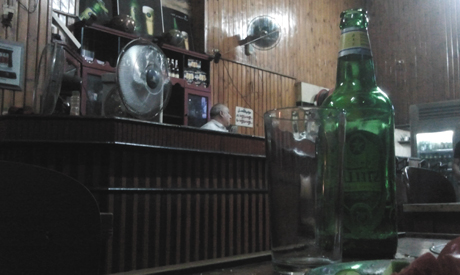 Egypt's Civil Aviation Ministry is considering a ban on the sale of alcohol in airport duty-free stores after it received complaints that it goes against the country's Islamic principles, ministry officials and a senior lawmaker said Tuesday.
Egypt's Civil Aviation Ministry is considering a ban on the sale of alcohol in airport duty-free stores after it received complaints that it goes against the country's Islamic principles, ministry officials and a senior lawmaker said Tuesday.
Duty Free officials said the ministry has been reviewing the policy for about four months after citizens and ministry officials complained.
Liberal and secular opponents of Egypt's Islamist president, Mohammed Morsi, fear he and his supporters are seeking to slowly enshrine a more conservative system in Egypt based on Islamic law. There are also concerns that steps such as banning alcohol would drive away tourists, a critical source of income for Egypt's faltering economy.
Morsi's Islamist group, the Muslim Brotherhood, has emerged as the most powerful political force in Egypt since the uprising two years ago that ousted the authoritarian regime of Hosni Mubarak.
Civil Aviation Minister Wael el-Maadawi, a former general who is not affiliated with an Islamist party, raised the idea of the ban in a meeting Monday with members of the interim parliament's transportation committee, said committee head Mohammed Sadeq.
Sadeq, a member of the Muslim Brotherhood political party, told The Associated Press he does not have an opinion on the matter at this time because the committee he heads is currently grappling with "much bigger issues."
"We are foremost talking about the country's economy. So even if this issue requires its proper place at the discussion table, now is not the time since there are bigger priorities at hand," he said in telephone interview.
He said the minister was discussing with lawmakers on parliament's transportation committee safety measures and how to ensure that alcohol bottles sold in airports are not used as firebombs.
Egypt has been embroiled in wave after wave of unrest in the two years since the uprising, with protests and clashes over a range of social ills from the deteriorating economy to poor security and Morsi's leadership.
El-Maadawi told the lawmakers there have been calls to ban the sale of alcohol in duty-free stores, though he did not say who the calls came from. He said they were looking into the complaints, but did not talk about any review or study of the policy, Sadeq said.
The Brotherhood lawmaker said the issue touches on both financial considerations and matters of Islamic law, which prohibits the sale and consumption of alcohol. Egypt is a predominantly Muslim nation and its laws include both religious and civil code.
The sale of alcohol in Egypt is allowed only to licensed dealers and tourist areas such as hotels, restaurants and bars, which are all heavily taxed and pay high customs tariffs for imports. There is also locally-made wine and beer. During the Muslim holy month of Ramadan, Egyptians are prohibited from purchasing alcoholic drinks anywhere.
Officials at Cairo's airport say the sale of alcohol and cigarettes accounts for more than half of total profits of duty-free stores in Egypt. All officials spoke on condition of anonymity because they were not authorized to speak to the media about internal reviews.
Duty Free Egypt, managed by Egypt Air airline and the airport administration, says on its website that it operates 67 retail outlets in all major Egyptian airports as well as space in a Cairo mall and two Red Sea resort towns.
Passengers are permitted to purchase up to four liters (4.2 quarts) of alcohol upon arrival, or three liters (3.2 quarts) within 48 hours. The law limits Egyptians to purchases of up to two times per year, whereas foreigners are allowed up to four times per year, though it is rarely applied.
Ahmed el-Borai, spokesman for the main opposition National Salvation Front, told the AP that banning the sale of alcohol will not stop people from drinking it.
"Are we asking people to bring alcohol from abroad? There is no reason for this study and it will affect tourism," el-Borai said.
There have been other hints that Egypt might be moving in a more conservatively religious direction.
Last year, the head of the upper house of parliament complained that Egypt Air was showing an old Egyptian movie with scenes he saw as too racy during an international flight. He wanted a review of the national carrier's policy on showing films.
Similarly, the spokesman for the ultraconservative Islamist Salafi Nour Party told a conference of tour guides last year that tourists should not be allowed to buy alcohol in Egypt but could bring it with them and drink it in their rooms.
The Housing Ministry's New Urban Communities Authority said no new licenses would be issued for liquor stores and current licenses will be revoked in new residential settlements. The decision does not affect tourist establishments such as restaurants or hotels that sell liquor.
The NSF's El-Borai said he is very concerned about "wasting time talking about films on an airplane or whiskey in the airport."
"People cannot find diesel to drive their cars, and maybe will not find electricity," he said of Egypt's current diesel crisis. "There are much bigger issues than this to think about."



